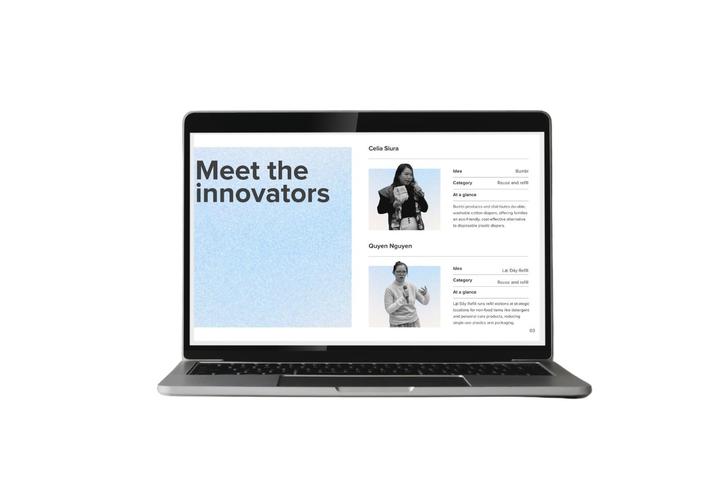Global Plastics Innovation Programme
Addressing plastic pollution through policy, innovation, and awareness raising
Background
Plastic pollution is a growing global crisis, endangering marine life, ecosystems, and human health. According to the OECD Global Plastics Outlook Database (2022), in non-OECD Asia, only 9 percent of plastic waste is recycled, while a staggering 87 percent is mismanaged or discarded into the environment. This unchecked pollution not only harms biodiversity but also accelerates climate change – plastics are derived from fossil fuels and emit greenhouse gas emissions not only during their production and manufacturing, but also as they break down in landfills or leak into the environment.
Each year, more than 100,000 marine animals die from ingesting or being entangled in plastic waste. The impact extends to human health as well – research suggests that the average person ingests microplastics equivalent to up to 50 plastic bags per year.
The Global Plastics Innovation Program (GPIP) was launched to drive practical solutions. Aligned with the Osaka Blue Ocean Vision, and its role in the G7 and G20, the Government of Japan, a key donor and partner, is spearheading efforts to eliminate marine plastic litter by 2050.
Project overview
Donor: Government of Japan
Implementing agency: United Nations Development Programme (UNDP)
Implementing partners: National governments, private sector, and civil society
Project duration: March 2024 - March 2026
Total budget: $ 361, 350 (Phase I), $ 750,000 (Phase II)
Countries: Cambodia, Indonesia, Lao PDR, Philippines, Thailand, Viet Nam
Project objectives
The Global Plastics Innovation Programme (Phase I and Phase II) aims to accelerate the transition toward sustainable, circular and low-carbon plastics management in Asia's tourism sector. The project seeks to strengthen policy and institutional capacities to reduce plastics use, promote innovative solutions through eco-design and reuse/refill systems, and raise awareness and understanding of plastic pollution to drive behavior change and foster demand for sustainable alternatives.
Summary
Phase I: Building policy capacity, supporting innovators, and promoting knowledge exchange
The first phase of the project laid the foundation for advancing circularity and reducing plastic pollution through three key areas: policy and regulation, innovation, and knowledge management.
A baseline assessment of the tourism sector in the Philippines provided critical insights into plastic use and waste management challenges, helping identify priority areas for policy action. These findings informed discussions during a multi-stakeholder workshop in Osaka, Japan, which gathered over 26 participants from nine countries – including policymakers, innovators, academics, and civil society – to exchange experiences, explore policy approaches, and learn from Japan’s practical examples in circular economy and waste management.
To foster innovation, the programme launched a global call for solutions and selected ten promising initiatives across the plastics lifecycle that illustrate how local ingenuity can translate global policy goals into tangible action. These were featured in “Shaping Solutions to Plastic Pollution: A Catalogue of Promising Ideas,” highlighting diverse approaches such as Indonesia’s reusable diaper initiative Bumbi and Viet Nam’s refill stations Lại Đây Refill.
To promote continued learning and visibility, the programme also organized webinars on policy options to reduce plastic pollution, implemented awareness-raising activities, and supported innovators through targeted communications products and outreach.
Phase II: Advancing circular solutions for a plastic-free tourism sector
Phase II strengthens the regional response to plastic pollution in tourism by expanding the baseline assessment methodology piloted in the Philippines to Cambodia, Indonesia, Lao PDR, Thailand, and Viet Nam.
The assessments examine plastic use and waste practices across the tourism value chain, identify policy and behavioural barriers, and propose pathways toward a circular and low-carbon sector. Building on these findings, UNDP is convening multi-stakeholder policy dialogues to inform national strategies and foster collaboration across government, industry, and civil society.
In the Philippines, Phase II also maps and assesses community-led reuse systems, EPR pilots and recycling initiatives to identify scalable circular business models for national and regional replication.

 Locations
Locations


